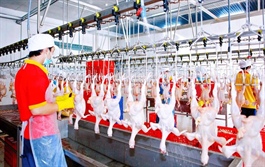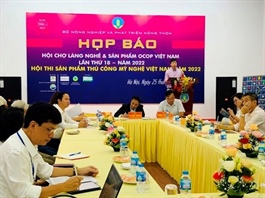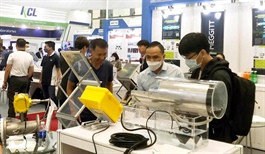Garment and textiles going green in push to hit turnover goals
Garment and textiles going green in push to hit turnover goals
The garment and textiles industry in Vietnam is going green, with a series of companies and factories embracing eco-friendly initiatives firmly in line with global trends.

After more than two years of construction, a new green factory went into operation on September 30 in the southern province of An Giang. The 100 per cent Danish-owned Specter clothing plant specialises in the manufacturing of outdoor sportswear for export and will be partly powered by renewable energy.
Garment and textiles going green in push to hit turnover goals, source: baodautu.vn
The facility was constructed following corporate social responsibility requirements and was awarded a Gold LEED certificate. Using solar energy and contemporary architecture, the factory can cut its annual CO2 emissions by around 1,600 tonnes.
The initiative also highlights the significance of the Vietnamese government’s commitment to reducing carbon emissions in luring high-quality foreign investment to Vietnam. When in operation, all sustainable production investment projects must utilise renewable energy.
This is Specter’s third facility in Vietnam and Denmark’s first foreign-invested project in An Giang, totalling up to $17 million. The plant will generate 2,500 local jobs.
On October 11, Hanoi Textile and Garment JSC (Hanosimex) and South Korea’s Hansae Group inked a collaboration agreement on a project for recycled textiles in Vietnam. This is the first of many successful initiatives in the textile and apparel industry’s transition to green manufacturing, satisfying the rising demands of international importers, including the United States, Japan, South Korea, and China.
According to Kyung Kim, senior vice president of Hansae Group, the effects of climate change have spurred the global government and industry community to take greater action. This tendency cannot be ignored by the textile sector, and it is vital to produce green goods and recover fabric to decrease waste.
“Hanosimex and Hansae Group will be the first companies in Vietnam’s textile sector to develop a comprehensive distribution network from yarn to weaving, dying, and sewing, entirely for recycled goods,” Kim said.
The two parties will undertake a project to create yarn and fabric from recycled fibres in Vietnam, and all of the factory’s goods will be exported. In the near future, about 4,000 tonnes of recycled fabric for the EU market are anticipated to be manufactured.
They will also continue to finish samples of yarn and fabric and effectively expand into other markets, such as the US and Japan, with knitted and woven textiles, to bring sales on both sides to the targeted $500 million by 2025 and $1 billion by 2030.
According to Le Tien Truong, chairman of the Board at Vinatex, the parent business of Hanosimex, the circular economy and ecologically friendly apparel goods are a trend in global textile markets.
“From now until 2050, the EU will implement new textile standards emphasising green goods,” Truong said. “The signing of a strategic collaboration agreement between Hanosimex and Hansae will assist both parties in increasing the volume and percentage of knitted goods of recycled origin and eco-friendly fashion items.”
In the initial nine months of 2022, the textile and apparel industry’s expected exports were $35.3 billion, an increase of 21.6 per cent over the same time in 2021 and over 80 per cent of the entire export target. According to Vu Duc Giang, chairman of the Vietnam Textile and Apparel Association, “The situation in Q4 will be less favourable as key markets mitigate imported products. However, due to the significant growth in the preceding three quarters, it is probable that the sector will still reach its export turnover target of $44 billion by the end of 2022.”
Greening production chains in the textile industry is a global trend that firms must adopt to meet sustainable development objectives. This is a necessity for suppliers if they do not want to be left behind since the EU, a $4 billion per year import market for Vietnamese textiles and apparel, has proposed new environmental requirements for textiles purchased for the market.
The proposal stipulates that textiles entering the EU market must be durable, reusable, and recyclable. Additionally, major apparel manufacturers worldwide and collaborators of Vietnam’s textile and garment businesses are gradually shifting to emphasising orders from green businesses.
Businesses that pollute during the manufacturing process, do not use energy-saving measures or exploit natural resources risk not being denied orders.






















